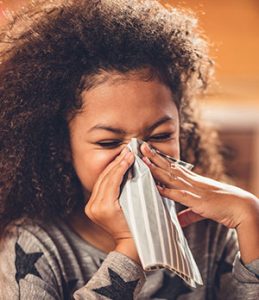
The flu shot is generally an effective way to protect yourself from the flu because it helps your body develop necessary antibodies to fight back against the virus. When the flu shot is well matched to the influenza strains that are circulating, you are less likely to get the flu. In fact, the CDC says the flu shot reduces your chances of catching the flu by 40% to 60%.
However, it’s not a perfect science, and some years, the flu shot doesn’t match as well as we would hope. For example, in 2017, the flu strain mutated right in the middle of the season. As a result, millions of people got sick with the flu, and 80,000 Americans died, according to the CDC.
It takes two weeks to kick in.
Another reason you can still get the flu even if you got a flu shot is that it takes time for your body to build up the antibodies it needs to fight off the flu. In most cases, this can take nearly two weeks. If you come into contact with someone with the flu virus before your body has developed enough antibodies, your immune system may not protect you from the flu.
Other factors may affect your risk of getting the flu.

Age can greatly affect how effective the vaccine is in reducing your risk of getting the flu. Infants and young children are at an increased risk of catching the flu because their immune systems haven’t had enough time to build up the antibodies they need to fight off a new infection.
Similarly, older adults may have a declining immune system as a result of other health conditions, such as diabetes, kidney or liver disease, or cancer. The CDC offers a higher dose vaccine for some adults over the age of 65 to help strengthen their immune system’s response.

